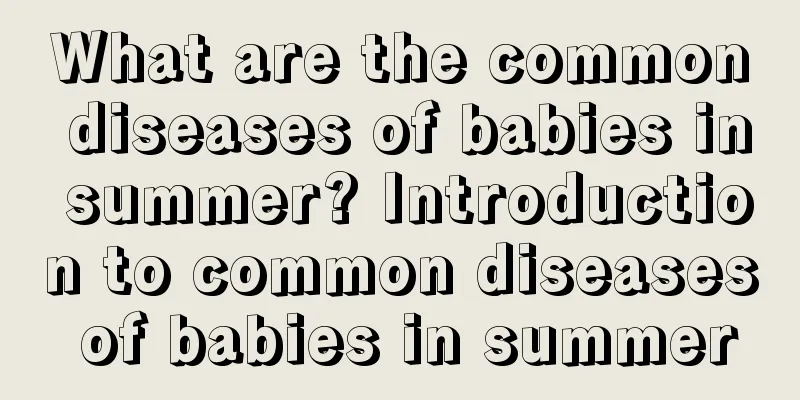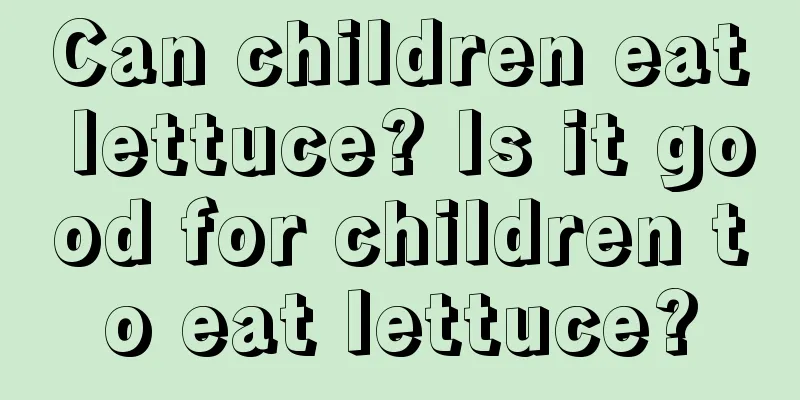What are the common diseases of babies in summer? Introduction to common diseases of babies in summer

|
What are the common diseases of babies in summer? How should we care for children in summer? Today, let's talk about these issues. Due to the special weather conditions in summer, many babies will suffer from unique diseases in summer. Please see the detailed introduction below, what are the common diseases of babies in summer? What are the common diseases of babies in summer?1. Prevent heat stroke on hot days It is easy to sweat in the summer. The sweat glands in the baby's skin are not fully developed and the body's water storage capacity is limited. Excessive sweating can easily cause dehydration shock. Breathing is an important way for the human body to dissipate heat, because the lungs are the secondary heat dissipation organ besides the skin, and when exhaling, the heat in the lungs can be discharged from the body (accounting for 10% of the heat dissipation). However, if the ambient temperature is higher than the body temperature, the hot air inhaled will even increase the body temperature. Since babies cannot effectively control their breathing and regulate their body temperature in summer, they are prone to heat damage. If the baby's skin turns red first, and you can feel dryness and heat when you touch the baby's skin. The baby is irritable and some may cry, and their breathing and pulse rate accelerate. Then they will appear tired, dizzy, convulsed, or fall into a coma. When measuring the body temperature, it may be as high as 39℃ or above. The baby is likely to have heat stroke. Mothers should effectively adjust the indoor temperature and keep the surrounding environment ventilated and the temperature appropriate. 2. Pay attention to baby dehydration Medically, it is called summer dehydration fever in infants. There are no obvious symptoms in the early stage of dehydration. Once the baby starts crying and getting irritable for unknown reasons, mothers should be careful. When this happens, mothers should replenish the baby with sufficient water in time. The disease is caused by the high temperature and dry climate in the hot summer, and the baby loses a lot of water through sweating. If the baby is not replenished with water in time, it will cause fever, and sometimes the body temperature can reach 39℃ to 42℃. 3. Not drinking enough water can also cause diarrhea In hot weather, babies sweat a lot. If they don't drink enough water, the digestive juices in their bodies, such as saliva, gastric juice, intestinal juice, bile, and pancreatic juice, will all decrease, affecting their appetite and digestive function. They will be very prone to diarrhea. After infection, babies generally have clinical symptoms of acute gastroenteritis, i.e. watery diarrhea, accompanied by fever, vomiting, and abdominal pain. The diarrhea is mostly white rice soup-like or yellow-green egg-drop-like watery stools with a foul odor. In severe cases, death may occur due to dehydration and complications such as pneumonia and toxic myocarditis. 4. Beware of summer colds The characteristic of summer is the scorching sun, which seems to be far away from cold and cold. But in fact, the baby's body temperature regulation center and skin heat dissipation and heat preservation regulation functions are poor. In summer, the indoor air-conditioned environment and the high temperature outdoors, the temperature difference between indoor and outdoor are large, so babies are very likely to catch a cold in summer. The baby's symptoms are: no sweating, thirst, frequent urination, loss of appetite, pale complexion and irritability, and the course of the disease can last for 1-2 months. Therefore, mothers are required to pay attention to ventilation and temperature control, and often let the baby rest in a relatively cool place. Whether outdoors or indoors, they must be kept clean, dry and ventilated, and feed the baby more light salt and cold boiled water in time. 5. Mosquito bites can easily cause skin diseases Summer is also the season when mosquitoes are active. The tender skin of babies becomes the target of attack, and they are more likely to be bitten by mosquitoes than adults. Babies can easily scratch their skin and cause bacterial infection, so don't underestimate these mosquitoes. When babies' hands and feet are bitten by mosquitoes, pigmentation will be left, and repeated scratching and scarring may leave scars like small red beans, which is the so-called "red bean ice" phenomenon. It not only hinders the beauty of the skin, but also turns into cellulitis in severe cases. Mothers should spray non-toxic insecticides before going to bed every day, or use mosquito nets for their babies. You can bring ointments such as Tiger Balm and Green Oil when traveling. 6. Prevent sunburn during outdoor activities As outdoor activities increase in summer, the possibility of sunburn also increases. After sunburn, the baby's skin will turn red, stinging and itchy. Some babies will cry, while others will only become irritable when the skin peels or stings. Some mothers are reluctant to use sunscreen for their newborn babies, thinking that babies don't need it, or they are worried that sunscreen lotion will hurt the baby's delicate skin. In fact, babies over six months old can start using sunscreen lotion. If you are outdoors for a long time, you can choose a sunscreen lotion with a sun protection factor of 15-25 and apply it to your baby every 4-5 hours. 7. Beware of traumatic infection After being bitten by mosquitoes, if the baby scratches the wound and bacteria invade, it is easy to form wound infection. Therefore, after the baby is bitten by mosquitoes, it is best to apply special medicine to the baby immediately to prevent scratching caused by itching. Introduction to common diseases in babies in summerWhat are the common diseases of babies in summer: baby cold Common diseases in summer include colds. Colds, also known as acute upper respiratory tract infections, are the most common diseases in babies, mainly affecting the nose, nasopharynx and pharynx. Symptoms: The symptoms of upper respiratory tract infections in children of different ages are different. 1. Infants under three months old with mild or no fever have more prominent symptoms due to nasal obstruction, such as crying, breathing with open mouth, difficulty in sucking, refusal to feed, sometimes accompanied by vomiting and diarrhea. 2. Infants and young children show severe systemic viral symptoms. At the beginning of the disease, they suddenly have a high fever of 39.5-40℃, which lasts for 1-2 days, and some even for several days. Some patients also have convulsions accompanied by high fever. In addition, they usually have severe symptoms such as nasal congestion, runny nose, cough or sore throat, and are often accompanied by digestive tract symptoms such as anorexia, vomiting, diarrhea or constipation. 3. Children over three years old usually have no fever or low fever, but some have high fever, accompanied by chills, headache, body aches and loss of appetite. In general, other symptoms of the upper respiratory tract are obvious, such as nasal congestion, runny nose, sneezing, hoarseness and pharyngitis. Treatment: 1. Timely antipyretic. After catching a cold, a fever may occur. After some children have a fever, the temperature is very high and they have a high fever convulsion (also known as convulsion), which is very serious. Therefore, it is critical to control the body temperature in time when the child has a fever. 2. Anti-infection. Since upper respiratory tract infections are mostly caused by viruses, antiviral treatment should be the main treatment. Therefore, it is recommended not to use antibiotics for the time being. Under the guidance of a doctor, some Chinese patent medicines suitable for children or commonly used pediatric antipyretics can be selected. If bacterial infection is confirmed, effective antibiotics should be given. 3. Cough relief. For mild coughs, it is not advisable to give a large amount of Chinese or Western cough-relieving medicines. General coughs (non-severe dry coughs) do not use central cough suppressants, such as Kebiqing and codeine. Prevention: 1. Cultivate good living habits. To prevent repeated respiratory infections in babies in summer, we must first cultivate good hygiene habits for children, such as washing hands frequently, not touching the nose and eyes randomly, and let children learn the correct way to wipe the nose; pay attention to oral hygiene on weekdays. Children should brush their teeth once in the morning and evening every day, and rinse their mouths with clean water after meals to prevent pharyngeal infections; open windows for ventilation frequently, wash and dry children's sheets and bedding frequently; try to avoid dust when cleaning. 2. Reasonable diet. Babies are in a critical stage of growing up. On the one hand, parents should prepare a variety of nutritious recipes for their babies, and strive to make nutrition comprehensive and balanced; on the other hand, they should encourage children to eat more fresh fruits, vegetables and whole grains and other foods rich in vitamins and trace elements; let children drink more water to promote metabolism in the body and reduce the chance of illness. 3. Strengthen exercise and enhance physical fitness. Let children have enough outdoor activity time, get enough sunlight, and breathe fresh air fully; arrange a variety of physical exercises for children to improve their own resistance; at the same time, ensure that children have enough sleep time. 4. Stay away from pathogens. Pathogenic viruses and bacteria of respiratory tract infections usually appear in crowded places such as shopping malls and stations, so parents should let their children avoid staying in such crowded places. 5. Dress appropriately. In seasons with large temperature changes, children should be given more care and wear appropriate clothes. Children should change their sweaty clothes in time after activities to avoid catching a cold. Children should be covered with a suitable quilt at night. Do not catch a cold because the quilt is too thin, and do not kick the quilt because it is too thick. What are the common diseases of babies in summer: air conditioning disease Another common disease in babies during summer is air-conditioning disease. Babies who live in air-conditioning environment for a long time are prone to the growth of pathogenic microorganisms because the space is relatively closed and the air is not circulating. In addition, the temperature difference between indoor and outdoor is large, and the body cannot adapt well, resulting in symptoms such as nasal congestion, dizziness, sneezing, tinnitus, fatigue, memory loss, and soreness of limb muscles and joints. This phenomenon is called "air-conditioning syndrome" or "air-conditioning disease" in modern medicine. Symptoms: 1. The baby's skin is thin and tender, with little subcutaneous fat, abundant capillaries, and the body temperature regulation center is not yet fully developed. 2. The main manifestations are easy fatigue, loose stools, loss of appetite, frequent diarrhea, repeated colds, etc. 3. When a weak baby stays in an air-conditioned room for a long time, when the baby suffers from "air-conditioning disease", it is even easy to cause allergic rhinitis, conjunctivitis and other symptoms. Treatment: 1. First of all, we must seize the first opportunity. After the baby suffers from "artificial cold" in summer, there will always be some signs, such as runny nose, nasal congestion, cough, fever, etc. In this case, the mother should give the baby medicine in time to control the condition and not let it develop. 2. Secondly, we must help the baby sweat. The baby's sudden cold caused a heat cold, and the folk saying is "holding back sweat". An effective way is to let the baby sweat. Give the baby more water, preferably boiled water and light salt water, which can help the baby sweat. Prevention: 1. The temperature is suitable. Generally, the air conditioning temperature is suitable at 25~28 degrees. When the temperature is high, the temperature difference can be adjusted to about 6~7 degrees; when the temperature is not too high, the temperature difference can be adjusted to 3~5 degrees, and the air speed of the air conditioner should not be too strong. The baby should enter the room first and then turn on the air conditioner. When going out, the air conditioner should be turned off first and the room temperature should be close to normal temperature before going out. The baby must avoid frequent entry and exit. 2. Frequent ventilation should be frequently opened to ensure the circulation of indoor and outdoor air. Turn off the machine after turning it on for 1~3 hours, and then open the window to exhaust the indoor air. Families with newborn babies should open at least one window when using air conditioning to keep the indoor air circulating. 3. Moisturize at all times. The baby's skin moisture regulation ability is far inferior to that of adults, so it is more difficult to adapt. If families with infants and young children want to use air conditioning, they should first give the baby more water, and at the same time artificially increase the indoor humidity appropriately. There are 3 ways to do this. You can use a humidifier, place a glass of water or some aquatic plants in the room, open windows frequently for ventilation, etc. 4. Dress appropriately. Children have delicate skin and sweat a lot. Clothing materials should be soft, moisture-absorbent, breathable and easy to wash. Light-colored pure cotton and pure knitwear are preferred. In an air-conditioned room, babies should wear one more piece of clothing than adults. What are the common diseases of babies in summer: summer heat syndrome Another common disease in summer for babies is summer heat syndrome. Summer heat syndrome is medically called summer fever in children. It mainly occurs in hot summer. It is not because the baby is infected with bacteria and has a fever, but because the body temperature rises due to the increase in the external environment, so some people call it "summer high fever syndrome". The body temperature is generally between 38-40℃, and the hotter the weather, the higher the fever. It lasts for 1-3 months until the weather gradually cools down. Symptoms: 1. Clinically, it is characterized by long-term fever, thirst, polydipsia, polyuria, oligosweating or sweat retention. 2. At the beginning of the disease, the heat damages the lungs and stomach, and the actual symptoms are serious, with long-term fever, thirst, polydipsia, polyuria, etc. 3. In addition to the typical manifestations of summer heat syndrome, symptoms such as pale complexion, cold lower limbs, and loose stools can also be seen. Treatment: Baby heat syndrome can be wiped or bathed with warm water, 2 to 3 times a day, 20 to 30 minutes each time. For children with high fever, white wine can be used for bathing. Diet therapy: 1. 15 grams each of mung beans and lentils, 50 grams of glutinous rice. Boil the two beans with water until they are almost cooked, add polished rice and cook porridge together, add a little white sugar and take it. 2. Take half a fresh lotus leaf, 15 grams of prince ginseng, 100 grams of polished rice, add water and cook porridge together, discard the lotus leaf when the porridge is cooked, and take it twice. 3. Half a fresh lotus leaf, 20 grams of coix seed, 50 grams of polished rice, cook porridge together, remove the lotus leaf when the porridge is cooked, add a little white sugar and take it. This recipe is suitable for those with greasy tongue coating. 4. 250 grams of water chestnuts, 25 grams of honeysuckle. Peel the water chestnuts and mash them, take the juice and boil it with honeysuckle, and drink it instead of tea. Prevention: 1. When the weather is hot, do not dress your baby too much or too thickly to avoid affecting the body's heat dissipation. Pay attention to adjusting the ambient temperature, such as using an air conditioner or living in a cool place; 2. When the baby has a fever, immediately place the baby in a room with a room temperature of 22℃-25℃ after confirming the heat syndrome. Giving the baby a warm bath also has a cooling effect, but be careful that the water temperature should be 3℃-4℃ lower than body temperature. Bath for 20-30 minutes each time, and wash 2-3 times a day; 3. Pay attention to giving the baby some watermelon juice, mung bean soup, winter melon water and other beverages to replenish the body's lost water, and give a light diet; under the guidance of traditional Chinese medicine, take some Chinese patent medicines or medicated foods that can clear away heat and replenish qi, nourish yin and clear heat to prevent and treat heat syndrome. Summer care essentialsFirst of all, we should arrange the diet reasonably and pay attention to balanced diet nutrition. In summer, food should be light, especially for children who like to eat meat. Parents should pay more attention to adjusting the diet structure and encourage children to eat more vegetables and fruits. Do not be greedy for cold drinks and do not eat too much at each meal to avoid damage to gastrointestinal function. Second, pay attention to food hygiene and personal hygiene, and let children develop good habits of washing hands before and after meals. Teach children not to eat at mobile vendors or restaurants with poor hygiene conditions, and not to eat while holding food. Families with pets must ensure good hygiene for the pets, and warn children not to feed the pets while eating. Third, we should add or remove clothes in time according to climate changes. We should pay attention to ventilation in the room to keep the air fresh. We should strengthen physical exercise to enhance the ability to resist diseases. We should pay attention to the combination of work and rest, arrange time reasonably, and make sure that we can study and rest at the same time. Fourth, for infants and young children, breastfeeding is encouraged, especially in the first summer after birth, which is the most important. Summer weaning should be avoided. When feeding artificially, attention should be paid to food hygiene and clean water sources. Whether breastfeeding or artificial feeding, complementary foods should be added at the right time, and the addition process should be gradual. Do not add several complementary foods at the same time. Fifth, diarrhea should be treated promptly, especially for children with infectious diarrhea, to minimize the damage caused by diarrhea to the children, while avoiding the occurrence of complications such as malnutrition, multiple vitamin deficiencies and multiple infections. |
>>: Introduction to summer baby recipes: What is good to eat for babies in summer?
Recommend
What should I do if a mother gets mastitis during the confinement period?
Women are particularly susceptible to mastitis af...
Which department should children with bronchitis go to? A guide to seeing a doctor for bronchitis in children
When children with bronchitis register in the hos...
How home learning can help children learn efficiently
Everyone must have heard of online classes in the...
How to store baby food? How to defrost baby food?
Babies don't eat too much complementary food ...
What tests should be done for children's snoring? Do children's snoring need surgical treatment?
Snoring in children is a relatively common phenom...
What should you pay attention to when buying your baby's first pair of shoes? How to choose baby's first walking shoes
After the baby has passed the sitting and crawlin...
When should you start using a pregnancy pillow when you are 7 months pregnant?
It can be used when the pregnancy is 7 months old...
What are the causes of fetal toxicity? Why does fetal toxicity occur?
Everyone must have heard of fetal toxicity in lif...
Will the fetal heart rate be normal if the fetus is hypoxic? Will the fetus still hiccup if it is hypoxic?
Pregnant women always pay attention to the condit...
What are the best names for babies in the Year of the Rat? The first choice for boys in the Year of the Rat
A nickname is a simple name called by family memb...
What are the ovulation pills? Types of ovulation pills
What are the ovulation drugs? Many infertile fami...
Can a newborn baby lie down when he hiccups? Why do newborn babies always hiccup?
Newborns are very fragile, so they need careful c...
What are the misunderstandings about feeding babies? 5 major misunderstandings to pay attention to
Many parents will continue to feed their children...
How to guide your baby to read picture books?
As children grow older, they may challenge the ro...
Can pregnant women eat ice cream? What are the effects of eating ice cream during pregnancy?
Pregnant women are a special group. Female friend...









